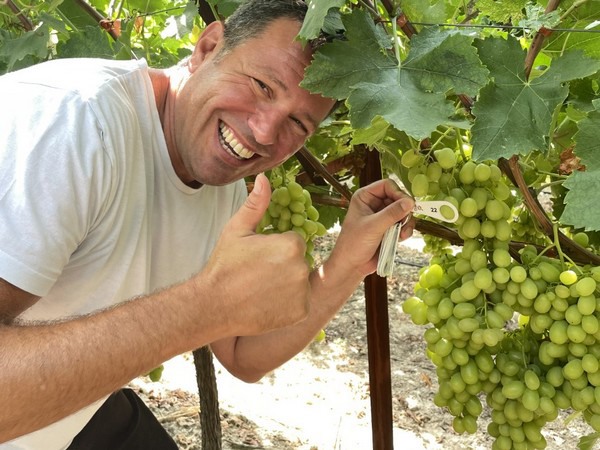While cultivating this season’s grapes in Greece, everything was set out to be the most perfect season. However, things took a turn later in the season, George Saliaris-Fasseas, founder of Greek Grape Company, explains: “Greek Grape Company cultivates mainly IFG varieties. The weather was very kind to our area, which is the North of Greece, and the grapes looked amazing until the end of July. Yields were strong, sizes are impressive, with a minimum of 20mm+, and we were looking towards the best grape season ever. Unfortunately, after that the weather turned tropical. Every day we experienced a south wind which brought relatively high humidity with it. This is the first time that has happened in our village, a traditional grape growing area, and it resulted in the grapes not finishing as solid as they normally would. So, we will not store any of the grapes this year and finish sales early.”
Despite the weather difficulties, the quantities for Greek grapes are solid this year, Saliaris-Fasseas says. “Volumes are 30% higher compared to last year, as 2020 plantations have now come into full production. The vines now produce more after their 3rd year, as they naturally get more productive. IFG late varieties, which GGC has planted, are on the high yielding end compared to other varieties.”
Even though Greek Grape Company will have more volumes, they’ll have to be sold earlier in the season to avoid storing the produce: “We focus specifically on both UK and German retailers. Demand in total is rather low, as consumers are pressed because of inflation and high energy bills. Nevertheless, we work closely with the supermarket buyers to offer competitive prices and a good product for the end consumer. Most of our volumes are pre-sold. The problem we face is we do not have enough fruit to fill the late part of the season, as we will not store them this year, and our clients will need to purchase overseas, like from Brazil. These are fruits with higher prices and more CO2 emission. But everybody was sympathetic to us, as we explained the weather situation early on.”

Saliaris-Fasseas sees the challenges with the weather as something they’ll need to adept to from now on: “We only had weather and higher input costs as challenges. Weather and climate change will be overcome by starting meditation and yoga! Joking apart, we try and do our part for the environment; we are the only one verified for sustainability-Leaf. Nevertheless, climate change is something we need to adapt to and offer options to our supermarket clients. Regarding input costs, we try and pre-buy in bulk and do tenders to lower the cost as much as possible. For example, last week we bought our copper for 2023 as we speculate that it will increase substantially in the coming months.”
Although Europe is dealing with huge inflation, it doesn’t change the way GCC does business. “The inflation in Europe doesn’t change the way we operate. We focus on producing excellent quality grapes and cover the market needs. Greek Grape Company cannot influence inflation. We will follow the market and our clients’ advice on it. Our season will be a short one unfortunately. The fruit on the shelves will delight our clients’ customers!” Saliaris-Fasseas concludes.
For more information:
George Saliaris-Fasseas
Greek Grape Company
Email: g@ggc.gr
www.ggc.gr
